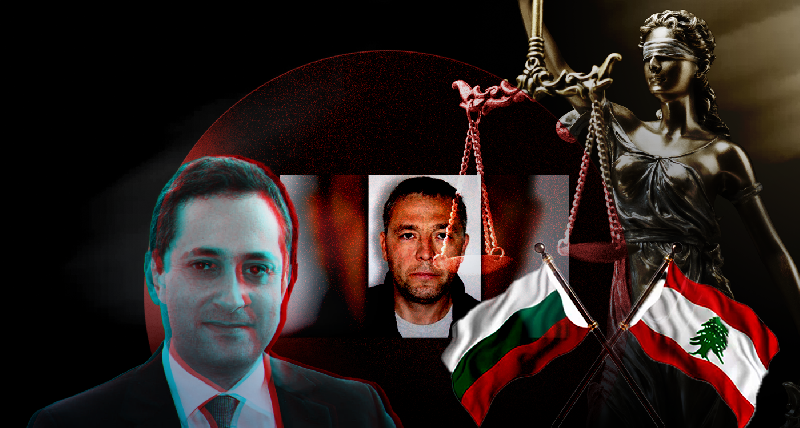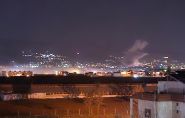
There are renewed signs of progress in the investigation into the Beirut port explosion of August 4, 2020. Two judicial tracks are taking shape: that of investigating judge Tarek Bitar, still mired in the legal actions brought against him, and that of Igor Grechushkin, the presumed owner of the Rhosus, currently detained in Bulgaria. Meanwhile, Beirut and Paris have resumed dialogue to boost judicial cooperation, a move seen as an effort to revive the pursuit of truth.
Tarek Bitar Before the Courts: A Decisive Hearing in November
After years of little progress, Judge Bitar is scheduled to appear on November 4 before Habib Rizkallah, the specially appointed magistrate handling the proceedings initiated against him by former Prosecutor General at the Court of Cassation, Ghassan Oueidate.
Oueidate accuses Bitar of “usurping authority” and “rebelling against the judiciary,” charges dating back to January 2023. Meanwhile, Oueidate also imposed a travel ban on Bitar, which remains in effect.
According to judicial sources close to the case, the measure could be lifted by the current Prosecutor General, Jamal Hajjar, “provided an official request is submitted.” However, the same sources indicate that Judge Bitar, as a matter of principle, refuses to submit such a request, considering the decision “illegal and unfounded.”
The November 4 hearing will therefore be limited to the appeals filed against him and will not address the travel ban.
Some legal experts disagree, arguing that once Prosecutor Oueidate’s “illegal and unfounded” decisions are overturned, they are nullified in their entirety, including the one regarding the travel ban.
The Grechushkin Case: Awaiting the Bulgarian Verdict
At the same time, the fate of Igor Grechushkin, a Russian-Cypriot citizen and the presumed owner of the Rhosus – the ship that in 2013 carried the 2,750 tons of ammonium nitrate at the root of the port disaster – is drawing close attention.
Arrested on September 5 at Sofia airport following a Red Notice issued by Interpol at Lebanon’s request, Grechushkin is now at the center of a complex legal battle.
Lebanese authorities, through the Court of Cassation, the Ministry of Justice and the Ministry of Foreign Affairs, promptly submitted all documents required for Grechushkin’s extradition, including a guarantee that the death penalty would not be applied if he were convicted.
The ball is now in the Bulgarian authorities’ court. They could either keep Grechushkin in detention, restrict his freedom of movement by preventing him from leaving the country or extradite him to Lebanon. In the meantime, Grechushkin is fighting for his release.
Grechushkin’s arrest led the Sofia court to extend his detention beyond the legal 40-day limit.
“Grechushkin has therefore appealed the decision extending his detention. With the Bulgarian courts having rejected his first request for release, the case is now in the hands of the Sofia Court of Appeal,” according to a well-informed judicial source.
Although Bitar intends to do so, he has not yet requested – contrary to some media reports – to question Grechushkin on Bulgarian soil. This was confirmed to This is Beirut by several judicial sources closely following the case. The judge nevertheless plans to hear Grechushkin to clarify the outstanding questions surrounding the cargo: its true destination, the ship’s financing channels and the international responsibilities in transporting the ammonium nitrate.
Based on available information, if Bulgaria refuses to transfer the Rhosus’s owner, Judge Bitar is planning a remote questioning via video conference, under a formal judicial cooperation agreement between the two countries.
It should be noted, however, that even in this scenario, the judge would not be able to question Grechushkin directly. Whether he decides to travel to Bulgaria (if the travel ban is lifted), conduct a remote hearing or use a rogatory commission (with the approval of the Lebanese and Bulgarian Ministries of Justice and Foreign Affairs), Judge Bitar would have to act through the Bulgarian judiciary. In other words, he would need to submit his questions to the Bulgarian authorities, who would then carry out the interrogation.
French-Lebanese Judicial Cooperation Relaunched
On the diplomatic level, a meeting took place on Wednesday at the Beirut Palace of Justice between Judge Souheil Abboud, the President of the High Judicial Council, and a French judicial delegation headed by Laureline Peyrefitte, the Director of Criminal Affairs and Pardons at the French Ministry of Justice.
The discussions focused on strengthening judicial cooperation between the two countries, both in the port case and in matters related to corruption and illicit financing. A joint action plan was agreed upon, including increased information sharing, material support for the Lebanese judiciary and activation of the Judges’ Mutual Assistance Fund.
The initiative has been welcomed in Beirut, with some viewing it as a strong political signal backing the independence of the Lebanese judiciary.
Five Years On: Justice on Hold
Five years after August 4, 2020, the families of the victims are still waiting for justice to be served. Long hampered by political interference and successive appeals, the investigation may finally be moving forward.
All the more so as both President Joseph Aoun and Prime Minister Nawaf Salam have expressed their commitment to protecting the independence of the judiciary and supporting the work of the investigating judge in this case.
Grechushkin’s potential extradition, or, failing that, his questioning in Bulgaria or via video conference, could mark a decisive step in tracing the chain of responsibility, from the cargo’s origin in Georgia to its deadly storage at the port of Beirut.
Combined with renewed cooperation with France, this momentum offers a small but tangible hope that, five years after the catastrophe, the truth may finally come to light.




Comments